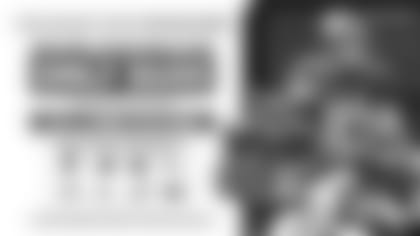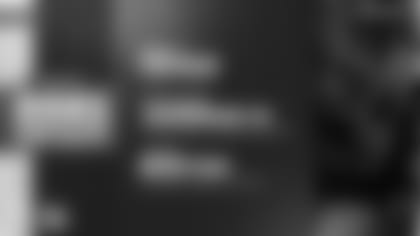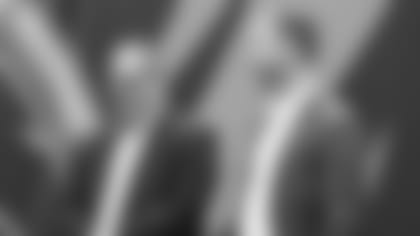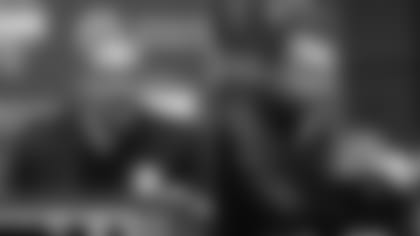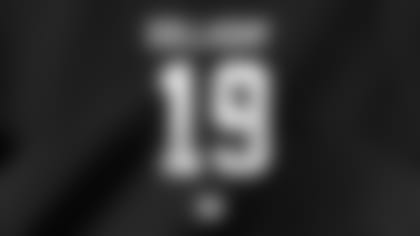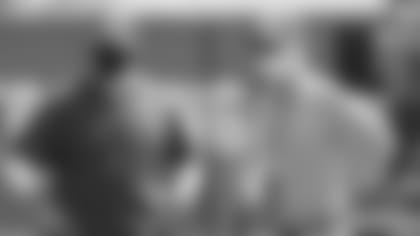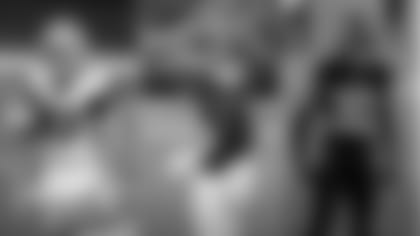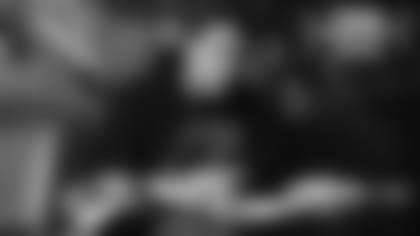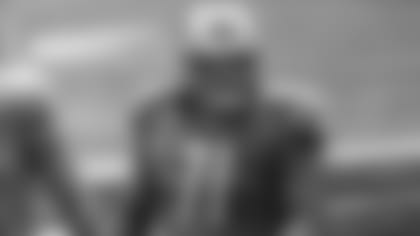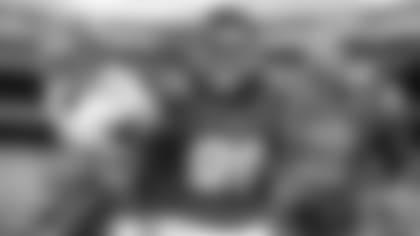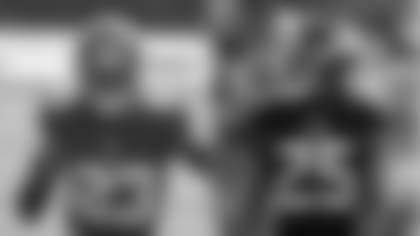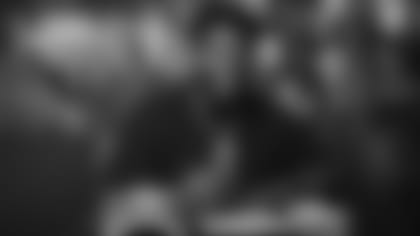Tight end Kyle Rudolph
Q: Take me through the last 24 hours, was there any added trepidation or any concern that this might not happen?
A: It was certainly an interesting 24 hours. One that was unexpected but to answer your question, no. It's kind of a blessing that we're able to find this issue. It was an issue from the season, we can fix it in March, and I won't miss any football. I'm extremely excited to be a New York Giant and I feel like it's a blessing that I'm able to deal with it now in March and not be a New York Giant and something that we deal with during the season. Like anything in life, I attack it head-on and I'll attack this rehab process head-on and I look forward to being out there with my teammates when we start playing football.
Q: How much of it was a relief for you that they [Giants] stuck with everything you guys agreed to given everything that went down, what they found in the medical?
A: There's a reason why I came here and one of the many reasons is the way this organization is run from the top down. I couldn't be more excited to be a New York Giant, to be a part of this team, a part of this locker room and be a part of this community.
Q: You obviously spent your entire career as a Viking, so how strange was it for you when you hit free agency and had to think about your future and how hard was it for you to decide where to go?
A: The hardest thing for me was to quit referring to the Vikings as 'we' and 'our'. I kept catching myself say 'we' and 'our' and I was no longer a Minnesota Viking. I've actually done it a couple of times today as well. It certainly was different being a free agent but for me going through the free agency process, each and every day were new updates, new teams, new opportunities and I remember telling my wife; we were sitting at lunch in Minnesota with our two-year old son and I just got off the phone with [Head Coach Joe] Coach Judge and [Offensive Coordinator Jason] Coach Garrett and at that point there were 12 or 13 different options and I knew New York was the place that I needed to be. This was the team; this was the organization that we needed to go to next. As soon as I hung up the phone, I knew that this was the perfect fit.
Q: When people look at your stats, they see the last two years compared to when you made the Pro Bowl a couple years before that. What do you say to why maybe the numbers look down compared to what people got used to?
A: It's simple, you can just look at my role and what I was asked to do. Just turn on the tape and watch what I was doing. A silver lining to that is, you look at the first eight years of my career and I was really only known as a pass catcher. I've played with a couple of really good running backs in my time in Minnesota with Adrian Peterson and Dalvin Cook most recently. With my role changing over the last couple of years, it wasn't that I couldn't run around and catch balls anymore, I was just doing more of the blocking stuff. I'm extremely competitive and it forced me to go one of two ways. I could have either complained about it or I could have taken it as a challenge to improve that aspect of my game. It's funny going throughout the free agency process and getting feedback from teams and hearing how good of a blocker they thought I was. That was just so foreign to be me because my whole life blocking was something that I really had to work on and never did well. Over the last two years I've been able to improve that aspect of my game and certainly looking forward to bringing that aspect of my game here to the New York Giants, now playing with another phenomenal running back in Saquon [Barkley].
Q: Getting back to the foot a little bit, is this the same issue that caused you to miss four games last year? Did you have some kind of surgery on this before? Was it a Lisfranc situation? Is this new or something different?
A: No, this is 100 percent what happened during the season that caused me to miss the last four games of the season. Everyone expected it to heal on its own and it didn't. It needs to be fixed and like I said, I'm just extremely grateful for the Giants' medical staff, Dr. Rodeo, everyone that was involved in the process. I'm excited to get it fixed and move past it.
Q: What do they have to do and what did they tell you about the timeline? Is this going to be like training camp or after training camp? What's the deal with that?
A: No, I'm not expecting to miss any football and like I said, I'm extremely excited that when we do start playing football to be out there with my teammates.
Q: You talked about the role you played in Minnesota, what role do you expect to play here and how do you expect to fit in with Evan [Engram]?
A: I'm looking forward to being able to bring both of those aspects [blocking and receiving]. Being able to improve my run game, pass protection over the last couple of years but knowing that I could certainly still help a football team, whether it be on first down and second down, third down, in the red zone. I really look forward to working with Evan and I think we can complement each other very well. Obviously, he does things that I can't even imagine of doing, but then you look throughout the rest of our room with Kaden [Smith] and Levine [Toilolo] and everyone that we have. We have four guys that can really go out and play at a high level. I think it allows your offense to really put defenses in tough situations when you can put multiple tight ends on the field. It really allows us to dictate how the game is going to go. I'm not even going to mention all the playmakers in the receiver room, there's just so many opportunities for this offense to go out and put pressure on defenses. I'm looking forward to being apart of it.
Q: I know you said that you don't anticipate missing any football, but obviously you have to take it as it comes. With that said, it's a new system and even though you're veteran and you've been around for a numbers of years, what can you do to kind of prep yourself for when you do hit that field and not missing any kind of a beat?
A: Fortunately my experience in Minnesota, in 10 years I've played with defensive head coaches, so that meant I had a lot of systems on offense that I learned over those 10 years, so I'm very familiar with learning new offenses, learning new systems, learning how I fit into that system and what I can bring to that system. This will be my sixth offensive coordinator in six years, so I've certainly learned how to work with play callers and how to learn new systems. As I mentioned before, getting off the phone with Coach Garrett, I'm extremely excited to be in this system. He obviously had an unbelievable track record with a tight end at a team that I don't think we mention around this place anymore, so we won't even talk about them. But he had a pretty good tight end down there for a long time and I'm just excited to be in this organization and in this system.
Q: You've always been a guy who scores touchdowns, a red zone threat, college and pros. What does it take to punch the ball into the end zone? What do you do so well to help your team score touchdowns and how can you help the Giants do that?
A: Just look at the red zone objectively. The field is condensed, there are smaller windows, tighter throws, but I think one of the things that has helped me throughout my career is making contested catches. You're not going to get a guy to schematically come wide open in the end zone, you don't see it very often. From time to time you may, but most of the time red zone scoring is bang-bang passes and it takes trust from a quarterback. 'Hey, I can throw this ball into a tight window and I know that either Kyle is going to catch it or no one is going to catch it.' I really just try to pride myself on when a quarterback believes in me and trusts me to throw a ball into a contested area that he knows that either I'm going to get it, or nobody is going to get it. Hopefully more times than not I'm getting it and we're scoring touchdowns. I think my basketball background has certainly helped me a ton in that aspect of my game because it's really no different than going up to grab a rebound off the glass. I tell people you look at the red zone and there may not be horizontal separation, you may not see guys running wide open, but an advantage that I often have at times is vertical separation, so throw the ball in the air where I can get it and a defensive back or linebacker that's covering me may not be able to.
Q: I just wanted to follow up on the surgery, what's the timeline for having it? Are you going to have it in New York? Are you going to go back home?
A: I'm having it as soon as possible and those are still details that we're working through. Like I said, I'm having it as soon as possible and I'm looking forward to getting back out on the field with my teammates.
